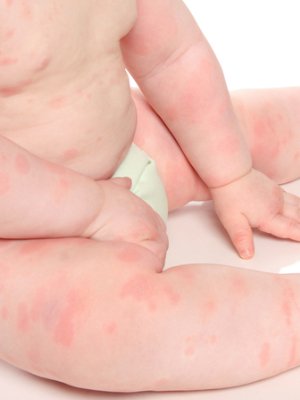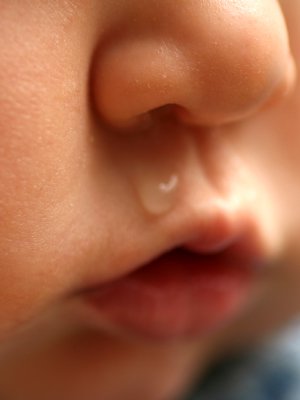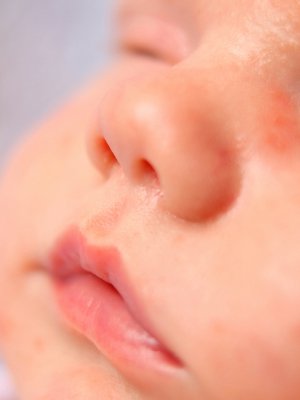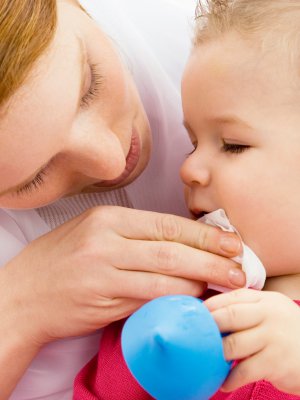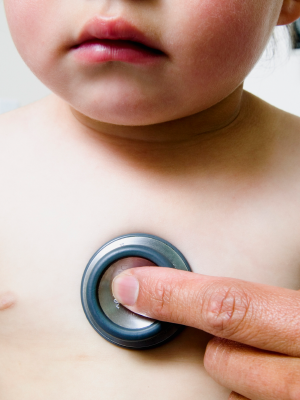
We believe breast milk is the best food for infants. When in consultation with their healthcare professional, mothers and families find that optimal breastfeeding is not possible due to their infant’s medical condition, formulas for special medical purposes play a vital role in providing essential nutrients to infants. We have a global commitment to market breast-milk substitutes responsibly.
If your baby shows any of these cow’s milk allergy symptoms, you should visit your doctor
We understand that the symptoms of CMPA can be distressing, particularly at this time when you just are getting to know your baby. If you suspect your baby may be allergic to proteins in cow’s milk, you should schedule an appointment with your doctor to confirm the diagnosis. Rest assured, CMPA can be easily managed by adjusting your baby’s diet as per your doctor’s advice.
It is important that you do not experiment with a cow’s milk-free diet for your baby without recommendation and guidance from your doctor.
The information in this section will help you understand what CMPA is and the most common sign and symptoms you may see in your baby, as well as how it is diagnosed and managed by your doctor.
Digestive
- Vomiting
- Frequent regurgitation
- Reflux
- Refusal to feed
- Colic
- Diarrhea (with or without blood)
- Constipation
- Dysphagia

Up to 60% of affected infants have digestive symptoms.
Respiratory
- Wheezing or noisy breathing
- Runny nose
- Persistent cough

Up to 30% of affected infants have respiratory symptoms.
Skin
- Hives, rash with raised red lumps
- Swelling of lips or eyelids
- Dry, scaly or itchy red skin (eczema)

Up to 70% of affected infants have skin-related symptoms.
General
- Tiredness
- Lethargy
- Restlessness
- Distress
- Sleeping problems
- Anaphylactic shock
- Growth disorders
- Inconsolable crying
Inconsolable crying is very common in infants with CMPA, while anaphylaxis is very rare.
Could it be CMPA?
Answering a few simple questions in the “Symptom checker” can help your doctor determine if your baby may have cow’s milk protein allergy.
Symptom checkerBe prepared for your doctor’s visit
Your doctor will examine your baby and ask about the symptoms your baby is experiencing. If CMPA is suspected, your doctor can perform tests to help make a diagnosis.
Learn more about how CMPA is diagnosed
The science behind CMPA
CMPA is a food allergy where the immune system reacts to proteins in cow’s milk. Your baby’s immune system recognizes the cow’s milk protein as a foreign body, just as it would recognize a virus or bacteria (pathogen), and starts to fight against it. This reaction can result in a variety of symptoms, including rash and anaphylactic shock (also known as anaphylaxis). Reactions that occur quickly, usually 2 hours after feeding, generally include vomiting and symptoms more commonly associated with other allergic reactions, such as wheezing or noisy breathing, skin rash (dermatitis), hives (urticaria) and swelling of the eyelids or lips. Other symptoms, such as regurgitation, colic, diarrhea, constipation, runny nose, cough and skin that is dry, scaly, or itchy (eczema) can develop days or even a week later.
The symptoms of CMPA, although distressing, can be easily managed by adjusting your baby’s diet. With advice from your doctor, you will be able to feed and see your baby grow and develop like any child, even with CMPA.
OTHER SYMPTOMS OF COW'S MILK PROTEIN ALLERGY
IMPORTANT NOTICE: Mothers should be encouraged to continue breastfeeding even when their babies have cow’s milk protein allergy. This usually requires qualified dietary counseling to completely exclude all sources of cow’s milk protein from the mothers’ diet.If a decision to use a special formula intended for infants is taken, it is important to follow the instructions on the label. Unboiled water, unboiled bottles or incorrect dilution can make babies ill. Incorrect storage, handling, preparation and feeding can eventually lead to adverse effects on the health of babies.Formula for special medical purposes intended for infants must be used under medical supervision.








